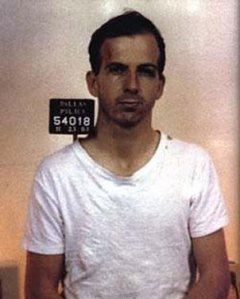 Within an hour of JFK’s assassination the Dallas Police had identified a suspect and just over an hour after he was murdered “they had their man”. In an age where they were virtually in the Stone Age in terms of technology, they were able to do what CSI could not do today. They got their man in seventy minutes. Great work right! I am sure the Dallas police department was in chaos. In fact, an FBI analyst said, “They lost control”.
Within an hour of JFK’s assassination the Dallas Police had identified a suspect and just over an hour after he was murdered “they had their man”. In an age where they were virtually in the Stone Age in terms of technology, they were able to do what CSI could not do today. They got their man in seventy minutes. Great work right! I am sure the Dallas police department was in chaos. In fact, an FBI analyst said, “They lost control”.
The arrested man Lee Harvey Oswald was a former US Marine who defected to the Soviet Union in October 1959. He lived in the Soviet Union until June 1962, at which time he returned to the United States with a Russian wife. Oswald would be charged with killing a policeman and the assassination of President Kennedy. He denied involvement in either of the killings. Two days later, while being transferred from police headquarters to the county jail; Oswald was shot and killed by Dallas nightclub owner Jack Ruby in full view of television cameras broadcasting live.
As most of us were told by The Warren Commission, established by President Lyndon Johnson to investigate the assassination, they concluded in 1964 that Oswald acted alone, firing three shots from a window in the Texas School Book Depository. Many Americans have questioned this conclusion. In 1978, the House Select Committee on Assassination determined in its own inquiry that Kennedy "was probably assassinated as a result of a conspiracy”.
His-story tells us that Oswald left the Book Depository heading to his house picking up a gun and heading to a movie theater. In route to the theater he sees or is stopped by a police man shooting him sever times. Then, for some odd reason, he decides to go to the movies. It was a store manager, Johnny Brewer, who testified that he saw Oswald "ducking into" the entrance alcove of his store. Suspicious of this activity, he watched Oswald continue up the street and slip into the nearby theater without paying. He alerted the theater's ticket clerk, who telephoned police at about 1:40 pm.
The police soon arrived, the house lights were turned on and Brewer pointed out Oswald sitting near the rear of the theater. Officer Nick McDonald testified that he was the first to reach Oswald and that Oswald pulled out a pistol tucked into the front of his pants, pointed it at him, and pulled the trigger. The pistol did not fire because the pistol's hammer came down on the webbing between the thumb and index finger, and it was taken away. Oswald then struck him and McDonald struck him back and he was disarmed. As he was led out of the theater, Oswald shouted he was a victim of police brutality. He was taken to jail about 2 PM where he was questioned about the shooting of Officer Tippit.
Oswald was formally arraigned for the murder of Officer Tippit at 7:10 PM, and by the end of the night about 1:30 AM, he had been arraigned for the murder of President Kennedy as well. Soon after his capture Oswald encountered reporters in a hallway. Oswald declared, "I didn't shoot anybody" and "They've taken me in because of the fact that I lived in the Soviet Union. I'm just a patsy!" Throughout, he repeatedly professed “I did not kill anyone”.
Reporters were allowed all kinds of access. They had not only the suspect being paraded up and down the hall with everyone could shout questions. Hundreds of reporters packed the hallways leading into the homicide division to film and take pictures of the man who killed President John F. Kennedy, sometimes making it difficult for Lee Harvey Oswald to even walk.
Oswald was interrogated for 12 hours about the assassination of President Kennedy and the murder of Dallas police Officer J.D. Tippit. He revealed very little about the crimes.
A WFAA reporter at the time reported, "During most of the night he tossed and turned." Oswald’s wife, mother, and brother were allowed to see him. They came in, and Oswald actually used the phone to talk to them on the other side of this glass. The phone calls were monitored; police listing to what he had to say. However, there were no records kept.
Disclaimer: The information contained in this series is that of the presenters and does not necessarily reflect the views of the author. It is information that is in the public domain provided for the reader to form an opinion. Whereas, it is the author’s position that the most profound sin is a tragedy unremembered and the absence of truth. And that’s my thought provoking perspective…
Follow the series “The Day The Dream Died”…









No comments:
Post a Comment